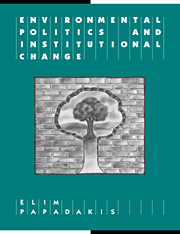Book contents
- Frontmatter
- Contents
- List of Tables and Figures
- Preface and acknowledgements
- Abbreviations
- Part I Introduction
- Part II Political Institutions, Innovation and Social Change
- Part III Political Organisations and Adaptation
- Part IV The Media, Agenda Setting and Public Opinion
- Part V Conclusion
- 17 Possibilities for constructive dialogue
- Appendix: Codes used in tables 9.1 to 12.1
- Notes
- References
- Index
17 - Possibilities for constructive dialogue
Published online by Cambridge University Press: 18 December 2009
- Frontmatter
- Contents
- List of Tables and Figures
- Preface and acknowledgements
- Abbreviations
- Part I Introduction
- Part II Political Institutions, Innovation and Social Change
- Part III Political Organisations and Adaptation
- Part IV The Media, Agenda Setting and Public Opinion
- Part V Conclusion
- 17 Possibilities for constructive dialogue
- Appendix: Codes used in tables 9.1 to 12.1
- Notes
- References
- Index
Summary
The Importance of Perceptions
In politics, as in all other areas of social life, perceptions are more powerful than logic. De Bono recounts the apocryphal story from the Cold War of the race between an American ambassador and a Russian ambassador: ‘The American ambassador won. The race was reported in the local press to the effect that there had been a race and the Russian ambassador had come second and the American ambassador had come just one before the last person in the race. There was no mention that this was a two-person race’ (De Bono 1991: 46). De Bono then emphasises that there can be no truth in perception: ‘It is always from a point of view. It is never complete.’
This fundamental point arises in portrayals of environmenmental politics and institutional change. Anyone wanting to influence perceptions about the failure by government to address environmental issues needs to look no further than the useful study by Philip Toyne, the former director of the ACF. Toyne reflects that Australia, both as a nation and a continent, leads the world in the rate of mammal extinction; that, since European settlement, we have wiped out eighteen species of mammals, a hundred species of higher plants, three species of birds, one species of reptile, and two species of freshwater fish; and that four hundred terrestrial and marine invertebrates and three thousand plants are at risk (Toyne 1994: 3–4).
- Type
- Chapter
- Information
- Environmental Politics and Institutional Change , pp. 197 - 208Publisher: Cambridge University PressPrint publication year: 1996



